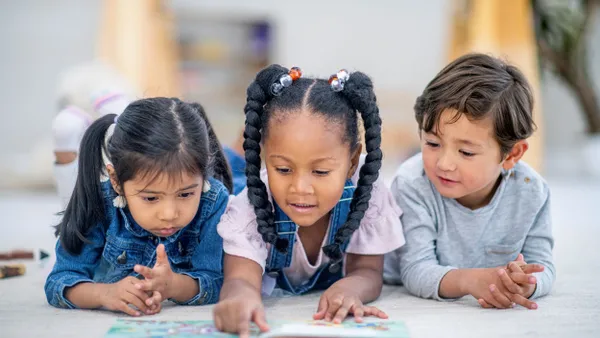Dive Brief:
- The Pathfinder Kindergarten Center in Everett, Washington, houses 545 kindergartners in a school setting designed for play, according to The Hechinger Report. The $26 million school opened in 2017 with features like heated floors and multiple indoor and outdoor play areas.
- The school's design focuses on the importance of play during the early ages. Research shows kindergarten can be one of the most important school years, and positive early experiences can yield a variety of benefits, including a higher likelihood a child will attend college.
- Washington state law mandated full-day kindergarten in all state schools, and to receive funding for full-day programming, schools must give kindergartners opportunities to learn art, science and physical education in addition to having hands-on learning and creative environments. Several states, including Washington, are rethinking kindergarten curricula and encouraging districts to have time for block building, coloring and imaginative play, according to Hechinger.
Dive Insight:
Play is important, with research continually finding play-based practices positively impact student learning and development. Child development expert Kathryn Hirsch-Pasek argues children learn best when they are actively engaged socially and mentally and can connect what they learn in a meaningful way to their lives.
Play is an important part of learning how to collaborate and be creative, which are marketable employment skills. Ken Robinson, author of “Creative Schools: The Grassroots Revolution That’s Transforming Education,” notes play is a normal part of children’s development. Playing and collaborating allows children to make connections as they learn, he has said, and they are enjoying it.
Some argue the loss of play in kindergarten is hurting students. Friedrich Froebel, who founded kindergarten in 1840, designed classes around the idea of a garden during play. Children were given objects and could play with them however they wanted, with encouragement to learn and grow.
Play has become part of the early education conversation because of a growing emphasis on academics at an early age. Researchers found in one study that teaching advanced academic content in kindergarten leads to higher test scores in math and English language arts. Yet, higher-level math is associated with stronger social-emotional skills, the study said.
There is also a debate around how much homework should be assigned in kindergarten. Phonics, spelling and reading, for example, can be part of a kindergartner’s homework expectations. While some say there is no value in homework at such a young age, others point out tasks like reading will form healthy, life-long habits.







 Dive Awards
Dive Awards





